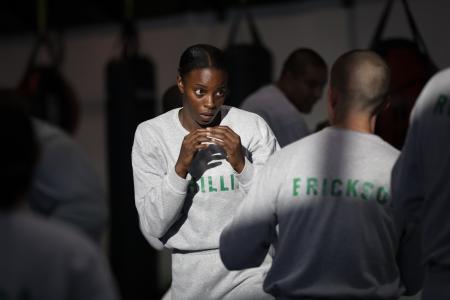
By Amanda Lee Myers
Associated Press

LOS ANGELES (AP) – Renata Phillip was 11 years into a satisfying teaching career when she shocked her friends and family last August by deciding to make a drastic career change: become a police officer.
Her decision came amid growing concern over police tactics in the wake of a number of deaths at the hands of officers of unarmed black men across the country. Most recently, the fatal police shooting of a black man who had a gun in his hand police sparked violent unrest in Milwaukee.
Phillip, a black woman who grew up in a mostly white, upper middle class neighborhood 30 miles east of Los Angeles, said she wasn’t motivated by race. But race is a motivation now as she completes her training to become a Los Angeles County sheriff’s deputy.
“Everything that’s going on, it drives me to work a little harder,” the 36-year-old said during a break at the department’s grueling training academy.
Phillip hopes to be an example to those who’ve never dealt with a black law enforcement officer. “If I can have a positive experience with someone and maybe help them change their mind, why not?” she said.
A little more than a year ago, Asia Hardy was in Phillip’s shoes, training to become an officer with the Los Angeles Police Department.
The 26-year-old, who grew up in an idyllic, close-knit neighborhood in Pasadena, has been a probationary officer for just over a year, working the beat she requested in one of the most dangerous neighborhoods in Los Angeles.
She said Phillip should expect both criticism and pride on the streets.
“I get called a sellout sometimes,” she said. Some will tell her: “Why are you doing the white man’s job?”
Others see Hardy as a beacon.
“They’ll say, ‘I’m glad you’re out here representing us,”’ she said. “Or you get the little girl pointing at you and saying, ‘Look, Mommy, there’s a girl cop.’ Things like that make my day. I want that little girl to know she can grow up and be a cop if she wants to.”
Black officers made up about 12 percent of all police in 2013, the most recent year nationwide statistics are available. That compares to the overall black population of 13.2 percent.
Departments have long struggled to recruit black candidates, said Nelson Lim, a researcher at the Rand Corp. who helps organizations diversify.
In 2004, Lim consulted with the LAPD, which was under a federal consent decree to hire more minorities. Even then, he said the department failed to meet its diversification goals.
Now with increased tensions, Lim said it’s only going to be harder.
“You don’t need a study to conclude that would have a negative impact,” he said.
In the days after a sniper attack killed five of his officers last month, Dallas Police Chief David Brown urged black people to leave protests and join the department to work for change from within.
“Serve your community,” said Brown, who is black. “We’re hiring. Get off of that protest line and put your application in.”
Phillip, the Los Angeles sheriff’s recruit, was settled into her teaching career at Ganesha High School in Pomona, a middle-class city near her hometown of Diamond Bar but far from it in terms of gangs and violent crime.
But she decided to become an officer after realizing she was spending more and more time helping her students with problems outside the classroom, and that she was enjoying it.
One student had lost a friend to gang violence. He started acting out by disrupting class, getting into drugs and into trouble.
Phillip said she worked to gain his trust and build rapport, which eventually allowed her to find out what was bothering him and help him transfer to another school. The change removed him from negative influences, allowing him to focus on school.
“Now you see a person who has taken charge of their past and isn’t letting someone else determine what they will or won’t do,” she said. “I thought, ‘I need to spend more time doing this.”’
Phillip is one of just two black women in her class of 84 recruits. More than half are men and most are white or Hispanic.
Only three recruits out of every 100 will make it to graduation, said Capt. Scott Gage, who’s in charge of training at the Los Angeles County Sheriff’s Department.
He cited extensive background checks, rigorous physical requirements, dozens of tests and determination to stick with the yearlong process.
Phillip’s mother worked as an accountant, her father as an engineer. When Phillip told her family about her decision to join law enforcement, there were tears.
“My heart really just sank,” said Phillip’s mother, Gloria Solomon. “Honestly, this is awful to say as a mother, but I almost wished she didn’t get through.”
Solomon said she was concerned not because of racial tensions in the U.S., but simply because policing is a dangerous job.
After praying about it and seeing how passionate her daughter was about law enforcement, Solomon said she’s now fully on board.
“I’m just really proud of her and I just really want her to be safe,” she said.
Hardy, the rookie LAPD officer, said she specifically requested to work in the most crime-ridden division.
“I knew a lot of African Americans live there and I wanted to be there to reach out, I want everybody to do better,” she said. “Them seeing me out there and knowing, ‘Wow, there goes a female cop. A black female cop.’ I wanted to be that example.”
Phillip also hopes to work in troubled neighborhoods.
“If I’m not putting myself in the position to really effect change then what am I doing?” she said. “Hopefully somewhere I have the opportunity to change someone’s mind. Hopefully that someone standing on the news protesting maybe sees me on the street one day and says, ‘Maybe I could do that.”’



